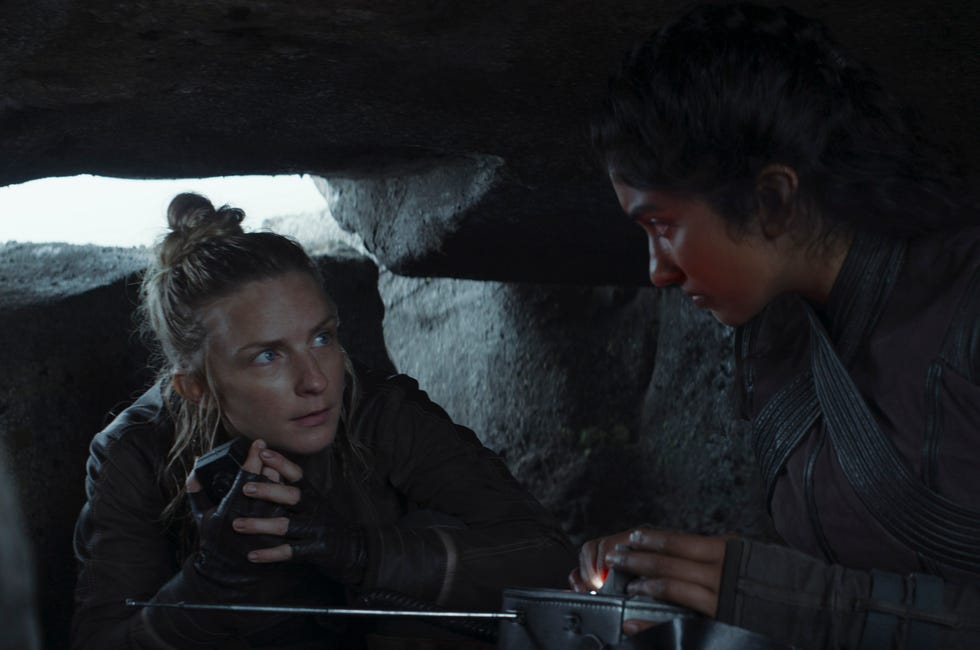Why That Shocking <i>Andor</i> Season 2 Death ‘Made Perfect Sense’ to Varada Sethu

Spoilers below.
Varada Sethu did not have much time to leave her mark on the excellent second season of Andor (which dropped its fourth, fifth, and sixth episodes tonight). The Star Wars prequel saga is a miraculously compact story, spanning years within its 12 total installments, and thus every minute of screen time is precise and economical. Yet, despite only appearing in two episodes this season, Sethu’s rebel warrior Cinta Kaz makes a stirring impression, particularly in the final moments of her life.
Star Wars fans first met Cinta (and, by extension, Sethu) in season 1, when protagonist Cassian Andor (Diego Luna) collaborated with a team of rebels, including Cinta, to stage a heist on the planet Aldhani. That heist was one of many sparks used to ignite what is officially known in season 2 as the Rebellion, a coordinated effort to undermine and overtake the fascist Galactic Empire, ruled by Emperor Palpatine. Near the end of season 1, a battle-hardened Cinta tells her lover and fellow rebel Vel (Faye Marsay) that their relationship must come second to the resistance itself.
But by the time we see Cinta again in season 2, episode 6, something has shifted. While working as a rebel asset to leader Luthen Rael (Stellan Skarsgård), Cinta suffered an accident. Although the details of her injury are left unclear, we learn it incapacitated her long enough to trigger an epiphany: Cinta is more than, as Sethu puts it, “a blunt weapon for the Rebellion.” She wants Vel—and Vel wants her. When they reconnect on the planet Ghorman, they decide they will confront Luthen together. They will make their next moves not as pawns but as a package. Where Cinta goes, so Vel will follow.
But their plans are short-lived. Whilst they assist the local Ghorman resistance leaders with a heist of their own, a reckless boy disobeys orders and accidentally fires his blaster, hitting Cinta in the chest. She is killed immediately, with no fanfare or final words. She is a casualty of ego and incompetence. As Vel carts her lover’s body away in the back of a truck, she tells Cinta’s inadvertent killer, “You’ll make up for this forever.”
Despite such a tragic ending for her character, Sethu—who also stars in the newest iteration of another blockbuster franchise, Doctor Who—considers the end of her Star Wars arc a “happy” fulfillment of narrative and theme. Cinta’s death “made perfect sense to me,” she says. “I could fangirl about this show forever.”
Below, Sethu breaks down the moments leading up to such a terrible twist in episode 6—and shares what makes Andor such meaningful television in the modern age.
When did you first learn that Cinta’s story was going to end this way?I got a call from Tony [Gilroy, Andor’s showrunner]. He gives you a briefing with each season, and so it was just a scheduled phone call. He talked me through the plot, and I was so happy. I wasn’t sad at all. I mean, I was sad in the sense that it would’ve been fun to be on set for longer, but in terms of Cinta’s story, I had made peace with the fact that she’s part of the Rebellion. There’s no way she’s going to make it out alive. Everyone in Andor dies, anyway, when you think of Rogue One. That’s what she signed up her life to, and it made perfect sense to me.
Did the two of you talk about why her death was important in the larger narrative that Andor is telling, especially within episode 6?Yeah. We talked about the fact that, in real life, you don’t get closure from people leaving you. It can be really sudden. And Vel and Cinta, specifically, almost get closure. They just about reconnect and are able to envision a future together—which, when you’re part of any kind of rebellion, is such a risky thing to do, to put your heart out there, because being part of a rebellion means you’re signing up to potentially never have a future. You’re fighting for the future for other people. It’s so incredibly vulnerable and risky what they’re doing.
It’s so common, in so many stories of freedom fighters, that these huge names fall. Anyone can fall in a second, and that’s what makes it so painful. There are so many people that die not just in the rebellion, but in a way that feels so unfair. Their lives get cut short and their potential isn’t met, and Cinta’s death scene reflected that.
I want to ask more about that, but first, let’s rewind to earlier in the episode, when Cinta and Vel first reunite. Cinta references an accident that kept her away from Vel and in recovery for “quite a while.” But we don’t ever get an explanation of that accident—what happened, when it happened, why it happened—and I thought that was such a brilliant choice. Did you, as an actress, have to come up with a backstory in your own imagination? Or did you prefer to leave it unexplained even to yourself?A bit of both. I asked Tony for details, and he gave me kind of brief details so I could fill in the gaps. And the way I saw it was, the actual incident itself wasn’t the important thing because, as far as Cinta was concerned, it was just a mission. She’s been used as this sort of blunt weapon for the Rebellion again and again and again and again. God knows how many people she’s killed, actually. All the things she’s done, she has to be immune to emotion; she has to shut down that part of herself.
What felt relevant was: When this accident happened and she was incapacitated, the one use that she had—the one identity that she tied her whole self-worth to—was taken away from her. And she had to re-evaluate, what does she want from her life? What are the things that are important to her? If she can’t express her anger and her pain toward the Empire through violence—because that’s where it all comes from, from trauma, from having lost so much—then what does she actually want from her life? When you are physically made vulnerable that way, you have to take account of all your vulnerabilities.

Vel and Cinta in Andor season 1.
And I think that’s what felt really important to me, in terms of mapping out what the accident might’ve meant for Cinta. I drew from a certain period in my life, a period at university where I got really sick. I’d never felt so out of control of my body and how I looked, I had lost so much weight and I was so weak, and it felt really sad. And there were so many things I had to confront in my life about how I was going about things, what I wanted for my life—that I didn’t want to be doing science or whatever it was.
The light at the end of the tunnel for me was, Okay, when I graduate, I’m going to go into acting. That’s what Cinta’s done: She’s made a decision that, fine, she’s going to be part of this fight because it’s important, but ultimately she is going to risk having hope in her future. And she wants to share it with Vel.
What do you think made her realize that she wanted to be with Vel, even if that was going to make working for the Rebellion that much harder?Vel and Cinta kind of realize that Luthen doesn’t really care about their future. He’s thinking about the big picture. He’s not thinking about their future. If they don’t think about their future, what they want, what they’re fighting for, he’s not going to do that for them. He’s not going to protect it.
I think Cinta realized what she is fighting for is a better future. And when she thinks about what a better future looks like, it’s with Vel. That’s what she’s fighting for. So her motivation to fight the Empire kind of changes. She’s brave enough to think, Well, this is what I want and I’m going to hope for it.
Tell me about workshopping the scene between you and Faye, where Cinta and Vel finally reveal that they want to be together, and they share this really meaningful, passionate kiss.This is a conversation that Cinta’s been thinking about for a long time. She’s someone who’s kept her heart very guarded, and she’s now opening up and actually saying, “I don’t know who I am sometimes.” The underlying message being, “I am such a hurt person. I’m so sorry. Can we reconnect? Because I realize that you’re the best thing in my life and my life is worth living because of you? All of this is worth something because you are in it.” That was the message that Faye and I talked about.
We actually couldn’t do a lot of planning. The filming schedule needed to be changed, and so we got a call at, I don’t know, 10 in the morning, and we were on set by 11 or 12. It was mad. It helped. The scene might have been really convoluted if it hadn’t been filmed a bit more off-the-cuff.


I found it really hard not to weep. Because I was in that truck [pretending to be dead], listening to Faye do that monologue, and I could feel the pain. I could hear the pain in her voice. I couldn’t see her; I can only hear what she was saying. And the anger that I felt, as me, toward this kid who’s a bit too big for his boots, and he gets cocky. And then you see his facade fall. Actually, he’s an insecure kid. He’s a kid, and now he has blood on his hands forever. Cinta will be a ghost that hangs over him forever, a life’s potential that will hang over him forever.
There are people who are going to relate to that as well: this moment of not thinking, and it costs so much. It’s so beautiful. Tragic, of course, but so clever. It’s so much worse than her dying in battle.
Much has already been made about Cinta and Vel being the first live-action LGBTQ relationship in Star Wars and why that’s meaningful. But I’m curious what it feels like, for you, to be a part of the bigger picture of Andor, given its mirrors to the real world right now.There were so many comparisons you could draw to the real world even when the first season came out, but now, yeah, the world is such a divided place. I feel so privileged to be part of a piece of art that is so unapologetically reflecting back to the world the state of things. This is the show that, if I weren’t in it, I would still be telling everyone to watch anyway.
Cinta and Vel’s relationship is not exploitative. It’s not there for drama’s sake. It doesn’t feel like a cheap ploy to bring people in. This is a real relationship that’s flawed, in that these people hurt each other and are not meeting each other’s needs. Vel’s always trying to reach out to Cinta. Cinta’s always cutting her off, and now she’s owning up to it. It’s a gay relationship, but it’s also a real one. It’s not healthy, and I love that. That’s also a mirror into the world. It’s so special to be part of something that’s so truthful, despite it being set in space with aliens. It feels so much more truthful than a lot of things that are happening right now.
This interview has been edited and condensed for clarity.
elle




